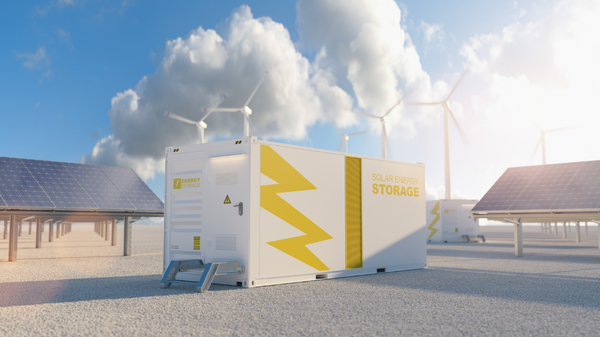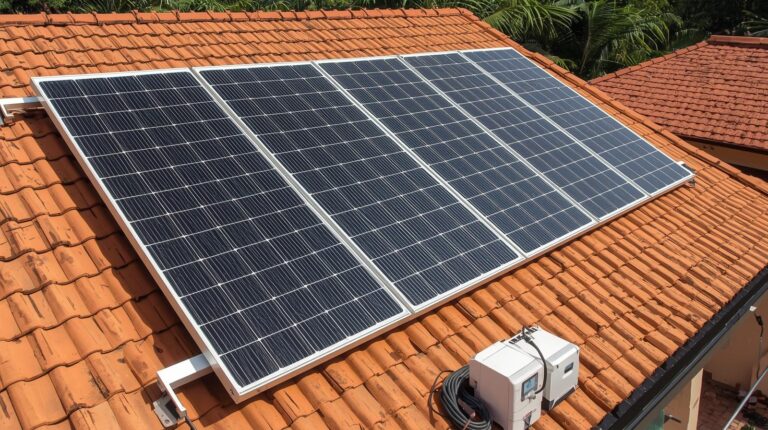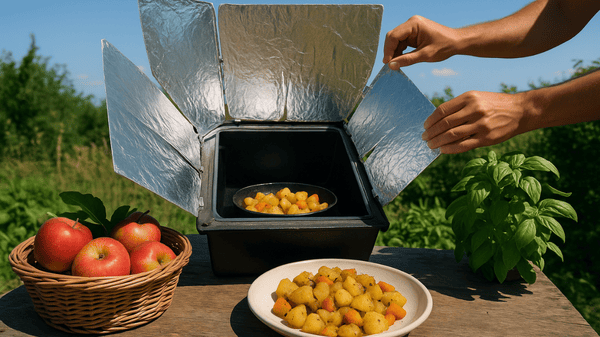Solar panels are a fantastic method to produce renewable resource and really help the environment. However, do solar panels store electricity? Can you use solar panels to keep electrical power? Keep on reading to find out!
Solar panels generate electrical power when exposed to sunlight, which is then utilized to power your house or company. Nevertheless, solar panels do not store electrical power.
For that reason, it is necessary to have backup source of power, such as batteries if you really need to utilize electrical power during the night or during a power blackout. In this post, we’ll take a more detailed look at how photovoltaic panel storage works and how it stores electrical power.
Reason Why a Solar Panel Doesn’t Store Electrical Power
Solar panels can not store electrical power due to the fact that it doesn’t have the elements capable of anything related to energy storage. The standard parts of a solar module have been talked about in our previous article.
Regrettably, it does not feature materials with properties of batteries, capacitors, or any other elements that enable the storing of electrical power. So, it can’t store energy. If they could integrate energy storage within the solar panels in the future, it might be a breakthrough in the solar market.
Up until now, solar panels can gather sunlight and turn it into electrical power. When coupled with an energy storage device, solar power systems can keep all of the electrical power produced by the photovoltaic panels, however not with photovoltaic panels alone.
How Can We Store Solar Power?
Solar power is a significantly popular source of power, however the sun just shines throughout the day, and we can’t produce solar power during the night. We really need to discover a man-made or natural option if we really want to keep solar power for later usage. There are two methods to keep solar power:
- Thermal storage: keeping heat from the sun for later usage;
- Electric storage: keeping electrical power that is utilized by our houses or companies during peak hours for later usage.
Others like gravity storage and hydro storage: utilizing solar energy to lift things or pump water to higher elevations keeping potential energy.
How to Store Solar Power Utilizing Batteries
Solar power is a renewable energy resource that can be used in a number of various methods. It’s not just the most abundant source of natural energy however also has a very low cost and doesn’t produce any greenhouse gas emissions. You might be asking, “How can we keep solar energy?”
There are lots of methods you can keep solar energy for later usage, from the large-scale grid-connected battery storage systems utilized by industrial and utility-scale solar energy projects to small-scale on-site battery systems for domestic houses. In this short article, we will explore how these two kinds of storage work and how they compare.
Solar energy is a reliable method to save money on electrical power expenses. However the sun just shines so much. What if there’s a day when it doesn’t shine enough? How can we keep solar power?
Storage of solar power is possible by utilizing batteries. Batteries don’t last forever, though. They need maintenance and a few of them really need to be changed regularly. There are likewise some costly choices that provide high-capacity storage for emergency situation purposes.
There are three main types of battery innovation readily available for keeping solar energy: lead acid, nickel-cadmium, and lithium-ion. Each one has its benefits and drawbacks for how they work best in various circumstances. It is essential to consider your requirements prior to choosing what type of batteries you prefer.
Batteries have restricted capability, and the expense of keeping big amounts of power makes it tough to keep extra energy from photovoltaic panels. Here, are some methods to keep solar energy in addition to include its advantages in our daily lives.
Storing Solar Power as Heat
One method of keeping solar power is by utilizing CSP or concentrating solar power. It uses mirrors, lots of them, to concentrate sunlight to a specific point or location.
The sunlight are reflected onto a receiver in a concentrating solar power (CSP) system, producing heat that is used to create energy that might either be utilized immediately or kept for later usage.
As a result, CSP plants can be dispatchable or flexible possibilities for providing clean, renewable resource.
What’s a Solar-Plus-Storage System?
You might not know it, however you’ve probably seen photovoltaic panels on some houses. Solar-plus-storage systems are the energy of the future. They provide a solution to really help homeowners reduce their energy expenses by keeping energy for use during times of peak demand.
Solar panels and energy storage devices are becoming increasingly more common nowadays. That’s because they’re both reliable and clean sources of electrical power. Nevertheless, it’s typically hard to know which one is the most ideal for you. So, here is a quick guide to really help you comprehend what solar-plus-storage is and how it works.
Solar energy is a renewable energy source, which indicates that it can never be diminished. A solar plus storage system is needed to keep this energy for use at a later moment. This option links your photovoltaic panels to a battery storage system set up on-site. The sun charges the battery storage system, which then launches the energy as required.
How Does a Solar Panel Work?
Solar panels are gadgets that transform sunlight into electrical power. This can be performed in two methods: utilizing photovoltaic cells to produce an electrical current or concentrating the sunlight with a lens to produce heat that drives a generator. Solar panels are typically made from silicon, a great material for absorbing sunlight.
The photovoltaic cells in a solar panel are set up in columns and rows, and they are linked by wires. Solar panels catch energy from the sun by absorbing it and transforming it into a usable form.
When sunlight shines on the cells, electrons are launched from their atoms. These electrons flow through the wires to produce an electrical current. The more sunlight strikes the solar panel, the more electrical power is produced.
Solar panels are usually used to power houses and companies, however they can likewise power automobiles, boats, and aircrafts. They are becoming significantly popular as the rate of electrical power continues to rise.
Solar panels are a sustainable and clean energy source, and they do not produce greenhouse gases or other contaminants. And also, they do not keep electrical power.
Battery storage is the most typical method to keep solar energy.
As solar energy ends up being more and more popular, people are trying to find methods to keep the energy produced by the sun.
Among the most common methods to do this is by utilizing a battery. Here we will take a look at a few of the advantages of using a battery to keep solar energy.
Reliable and Efficient Method to Store Solar Power
Among the primary advantages of using a battery to keep solar energy is that it is a very efficient method to do so. A battery can keep a large amount of energy in a little space, making it perfect for solar energy.
Stabilizing Power Grid with Solar Power and Battery
Another advantage of using a battery to keep solar energy is that it can really help to stabilize the grid.
When there is a lot of solar energy being produced, it can trigger the grid to end up being overloaded, causing blackouts and other issues.
Nevertheless, if some of that solar energy is kept in batteries, it can really help to stabilize the grid and prevent problems from occurring.
Environment-Friendly Source of Energy
Finally, utilizing a battery to keep solar energy can likewise help to safeguard the environment. When solar energy is produced, it does not produce any emissions.
Nevertheless, when that solar energy is stored in a battery, it can be utilized to power houses and companies even when the sun is not shining.
This suggests that there will be less really need for fossil fuels, which will help to decrease emissions and safeguard the environment.
What happens to excess electrical power from photovoltaic panels?
Solar panels utilize the sun’s energy to produce electrical power. Electrical power from photovoltaic panels is as clean as it gets and we love how this green source of power can save you money too! However, what do you do with all of that surplus power? Well, here are some alternatives:
- Offer excess energy back to the grid (Possible with net metering).
- Utilize electric car charging stations (Possible with an EV battery charger).
- Set up batteries to keep power produced throughout the day for night use (Possible with battery storage).
- Link your photovoltaic panels to a home battery system (Available through Tesla, LG Chem, and Enphase).
- Run your houses.
It can result in a significant waste of energy if power isn’t stored efficiently or used effectively. Solar energy is a renewable resource that has actually helped fight climate change, create jobs, and keep money local.
Now, let me also present to you our previous article about home solar power battery storage system here. You might find that article helpful if you really want to dig more details into this topic.
Conclusion
Solar panels do not keep electrical power; they just produce it when exposed to sunlight. In conclusion, we saw that photovoltaic panels are not capable of keeping the produced solar power by themselves. It requires a devoted energy storage device that can be charged utilizing the produced electrical power from the PV panels.
The first step is to choose what you really want to keep the energy for. If it’s daytime energy, you’ll really want to save for nighttime use or utilize it right away. The second step is to choose a battery storage system that fits your requirements best.
Some batteries should be charged by the sun and others can be charged with power from the grid. Finally, ensure your inverter can deal with the power of your photovoltaic panels and batteries before anything else!




